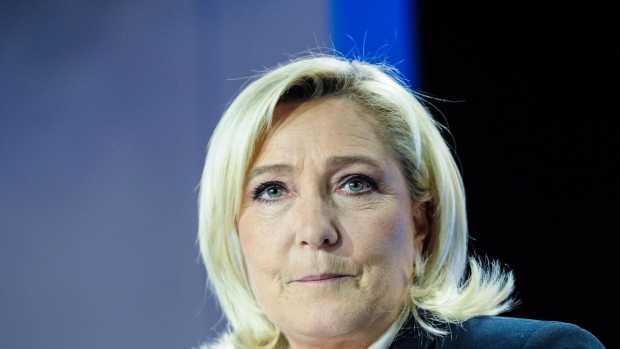Jul 3, 2024
Le Pen’s Far Right Faces a Struggle as Rivals Band Together
, Bloomberg News

(Bloomberg) -- President Emmanuel Macron’s centrist group and a left-wing alliance strategically pulled hundreds of candidates from the second round of France’s legislative election to reduce the chance of Marine Le Pen’s far-right National Rally getting an absolute majority.
National Rally’s opponents collectively pulled 223 candidates out of constituencies with more than two people in Sunday’s runoff vote, according to Interior Ministry data released Wednesday, in an effort to avoid splitting opposition to the far right. That means Le Pen’s party and its allies will be on the ballot in 214 districts where rivals have teamed up.
A poll by Toluna-Harris Interactive conducted on Tuesday and Wednesday showed that the National Rally and its allies would get between 190 and 220 seats, significantly less than the 289 needed for an outright majority.
Le Pen has been seeking allies to get a majority in the 577-seat lower house that would enable her group to impose its agenda in a power-sharing arrangement with Macron. In this so-called cohabitation, the president would still control matters of foreign affairs, including defense.
If the National Rally gets the most seats but falls short of an absolute majority, there would be a hung parliament in which no party would have the numbers to unilaterally pass legislation.
Macron dissolved the National Assembly last month and called a snap legislative vote after his alliance was trounced in European Parliament elections, a decision that initially led to the worst bond rout since the sovereign debt crisis and wiped almost $200 billion off the value of stocks.
- Sign up for the Paris Edition newsletter for special coverage throughout the French election.
His party and its allies, which promote a pro-business, pro-Europe, pro-Ukraine vision for France, lagged in third place in the first round last Sunday. Le Pen is trying to convince voters to hand her an absolute majority so she can implement a program that includes reversing Macron’s pension reform, cutting value-added tax and reducing immigration.
The National Rally’s president, Jordan Bardella, repeated in an interview published in Le Figaro that he expects to secure the seats the party needs, adding that he’s ready to reach out to center-right Republicans to make up the numbers.
The quant team at Jefferies Financial Group Inc. said that a simulation it ran as the number of dropouts became apparent showed the far right unlikely to get an absolute majority.
“Our analysis, which is based on a seat-by-seat allocation and assumptions around ideological distance and absenteeism, shows a weaker performance from RN than current opinion polls suggest,” strategists Mohit Kumar and Dominik Winnicki wrote in a note, using the French abbreviation for the National Rally.
Some projections after Sunday’s first round showed the party could obtain more than half of the seats in the National Assembly.
Taking into account all parties, 227 candidates pulled out of a total of 225 districts overall, including 130 from the leftist New Popular Front alliance and 76 from Macron’s group, according to ministry data. The number of three-way races has now fallen to 89 from 306. There are also two four-way contests.
Both of Sunday’s possible outcomes — an outright Le Pen victory or a hung parliament — would hurt efforts to fix France’s public finances and threaten a wider European impact, according to Scope Ratings analysts Thomas Gillet and Brian Marly.
The alternatives “would in either case diminish the prospect of growth-enhancing and cost-saving reforms, adding pressure to France’s sovereign credit rating,” they wrote.
--With assistance from Vidya Root.
(Updates with poll in third paragraph.)
©2024 Bloomberg L.P.








